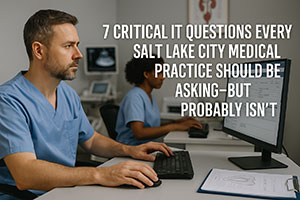 If you're only talking to your IT provider once a year—usually during contract renewal—you’re putting your Salt Lake City medical practice at serious risk.
If you're only talking to your IT provider once a year—usually during contract renewal—you’re putting your Salt Lake City medical practice at serious risk.
Your healthcare technology systems aren’t “set it and forget it.” With constant changes in cybersecurity threats, HIPAA compliance regulations, and the demands of modern electronic health records (EHRs), you need consistent quarterly IT check-ins to stay secure, compliant, and operational.
Not sure what to ask? Here’s a checklist made for busy physicians, practice managers, and healthcare administrators who want peace of mind—not more jargon.
- Are There Any Security Vulnerabilities in Our System Right Now?
This isn’t a hypothetical. You need to know today:
- Is our network security current and HIPAA-compliant?
- Are all devices in our Salt Lake City practice protected with up-to-date antivirus?
- Have there been any attempted ransomware or phishing attacks?
If your IT provider can’t clearly answer this, your patient data and medical operations could be exposed.
- What’s the Status of Our Backups—and Have You Tested Them?
Imagine losing access to EMRs or patient files. It’s not just inconvenient—it could shut your clinic down.
Ask:
- Are we backing up both patient records and financial data?
- Are backups encrypted and stored in HIPAA-compliant cloud systems?
- When was our last successful recovery test?
For healthcare providers in Salt Lake City, backup and disaster recovery plans aren’t optional—they’re essential.
- Are Our Employees Following Cybersecurity Best Practices?
Human error is the #1 reason for breaches in small medical offices.
Make sure your MSP is helping you answer:
- Are staff using multi-factor authentication?
- Do we need additional phishing awareness training?
- Have there been any recent red flags or login anomalies?
A good IT provider for medical clinics will offer both protection and proactive staff training.
- Is Anything Slowing Down Our Network or Systems?
If your EMR drags or the internet cuts out during intake, that’s a red flag.
Ask your provider:
- Are any devices or platforms creating network bottlenecks?
- Is our current IT infrastructure still appropriate for our staff size and hybrid workflows?
- Can we optimize uptime and performance across departments?
Salt Lake medical practices can’t afford slowdowns when patients are on the schedule and charts are due.
- Are We Still HIPAA Compliant?
Healthcare compliance is always changing. Staying current is vital.
Ask:
- Are there any recent changes to HIPAA or state data privacy laws?
- Are our documentation and data security policies up to date?
- Have we reviewed our risk assessment in the last 12 months?
A proactive healthcare IT provider should guide you through every regulatory shift.
- What Should We Budget for Next Quarter?
Too many clinics in Salt Lake get hit with surprise bills for outdated hardware or expiring licenses.
Prevent that by asking:
- Are any devices or software licenses nearing end-of-life?
- Should we budget for network upgrades or increased cloud storage?
- What improvements would increase reliability or speed?
Proactive planning = fewer disruptions + better cost control.
- Are We Falling Behind on Healthcare IT or Cybersecurity Trends?
Salt Lake City is full of growing, tech-forward medical practices. Is yours keeping pace?
Ask your provider:
- Are we missing key tools or security protocols?
- What are other local clinics using that we aren’t?
- What emerging threats should we be preparing for?
Healthcare cybersecurity evolves rapidly. Your IT partner should keep your practice two steps ahead.
If You’re Not Having These Conversations, It Might Be Time for a Change
If your current Salt Lake City IT support can’t confidently answer these questions, it’s more than a service gap—it’s a risk to your practice, your patients, and your peace of mind.
We offer a FREE Security & Network Assessment specifically for medical practices in Utah. You’ll get a clear, jargon-free view of where you stand—and what needs fixing before the next problem hits.
👉 Click here to schedule your FREE Network Assessment and start treating IT like patient care: proactive, not reactive.



